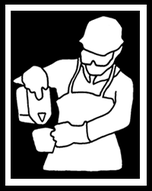Pesticide Safety

In spring, homeowners start waging a war on insects and weeds around their homes. Whether you are using organic or synthetic chemicals correctly is vital to your health, as well as how well the chemical works. Pesticides can be important in your gardening toolbox, but only if used properly. Here are some tips for using pesticides safely around your home this year.
- Correctly identify what you want to control: Before applying any chemical, the first step is to figure out what you are trying to control in the first place, whether it's a weed, an insect, or a disease. If you apply the wrong product, you won't solve your problem and could worsen it. If you can't figure out what is happening, contact me, and I can help you figure out what is happening. Pesticides may not be needed at all.
- Choose the right pesticide: Once you know what you are trying to control, you can figure out what product to use. There are thousands of products on the market, so your first step when shopping for a product is to read the label to see if the pest, disease, or issue you need to control is listed. You should also consider other factors when picking a chemical, including environmental safety, ease of use, cost, and application equipment needed. Choose the pesticide with the lowest environmental impact or danger rating possible.
- Read the Label!!! The label will give you all the information needed to safely apply that chemical, including the clothes to wear, the rate to apply, the weather to apply in, how long till it rains fast, and how to clean up after the chemical is used. Be sure to read the label before mixing or applying any chemical.
- Clothing counts: Most of the time, exposure to chemicals can be prevented by wearing the proper clothing, including closed-toed rubber shoes, long pants, long-sleeved shirts, and the correct gloves. It's essential to wear the appropriate attire. After you finish your application, wash your clothes using powder laundry detergent on the washing machine's hottest and deepest water setting. Be sure to wash those clothes separately from all other clothing to prevent chemicals from damaging your family's clothes. To clean the washer, run it one cycle after you wash the spray clothes.
- Don't forget the Shoes: Be sure to remove any shoes you used to spray outside the house and triple-rinse them off to make sure the chemical has been removed. Leave them in a garage and use them only outside.
- Always use the original container: No matter what chemical you use, keep it in the original container. If a neighbor asks to borrow some chemical, always send the main bottle; never give them some in a pop or other bottle. There have been too many cases where someone accidentally drinks chemicals because they weren't stored properly. If you must transfer it to another container, clearly label that product and include the label when possible.
- Storage and Disposal: Store all chemicals away from children, preferably in a locked cabinet. Chemicals also should not be allowed to freeze in the winter as this impacts their effectiveness. If you have extra chemicals you won't use, dispose of them properly at a hazardous waste collection site. Never dump chemicals down the drain or pour them onto the ground. Once a bottle is empty, triple-rinse it before disposing of it.
Pesticide safety is an essential aspect of working in a lawn or garden. Even organic chemicals can be harmful if you are exposed to them. Chemicals are not dangerous; they are tools in a gardener's toolbox when used correctly. The issues happen when you don't read the label or follow the instructions. Remember to be safe, read the label, and have a wonderful gardening season.

Have questions? Contact our office where our Horticulture Extension Agent will assist you with questions.
Phone: (316) 321-9660
Email: callae@ksu.edu